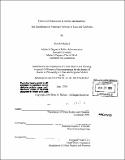Farm-level bureaucrats in action (and inaction) : the distribution of veterinary services in Laos and Cambodia
Author(s)
Ballard, Brett M
DownloadFull printable version (9.956Mb)
Alternative title
Distribution of veterinary services in Laos and Cambodia
Other Contributors
Massachusetts Institute of Technology. Dept. of Urban Studies and Planning.
Advisor
Karen R. Polenske.
Terms of use
Metadata
Show full item recordAbstract
In this study, I analyze several dimensions of the institutional environment that govern contractual exchange between veterinary service providers and farmers in Laos and Cambodia. I hypothesize that the negotiation, implementation, and enforcement of informal service contracts entail economic and social transaction costs that can distort provider incentives, thereby affecting the quantity, quality, and financial sustainability of services over time. I have employed qualitative field research methods to interview service providers, government officials, and farmers about their role in and perceptions of veterinary service delivery. I focus my analytical attention on the community-based service providers as they are the key institutional link between the supply of and demand for veterinary services at the local level. In Laos, I analyze the relationship between the mode of agricultural production within a particular agro- ecological setting and the incentives that motivate Village Veterinary Workers (VVWs) to provide services. I identify five different service-provider types, including citizen vaccinators, barefoot entrepreneurs, special agents, warrior vaccinators, and dormant providers. In Cambodia, I analyze how exchange relationships between government technicians and farmers, and among government officials of different administrative levels, were structured according to an ethics and logic of patron-client relationships that characterize social interaction in much of Cambodian society. I show how a complex system of shadow revenues and gift exchanges enabled farm-level bureaucrats to distribute animal vaccines and maintain organizational cohesion during ongoing social and political unrest in the early-mid 1990s. (Cont.) I then analyze how informal service contracts between Village Livestock Agents (VLAs) and their clients are governed by local norms of reciprocity and mutual exchange in rural northwest Cambodia. I identify two types of VLA entrepreneurs, charismatic/benevolent and career/professional service providers, who continue to provide services on their own. I also analyze how VLA professional associations can support the sustainable delivery of services by private sector providers. I conclude that reform measures, including those featuring some elements of privatization and/or decentralization, can be successful only to the degree to which they establish or strengthen supporting institutions that take into account local realities governing contractual exchange between service providers and clients. This observation is especially relevant in situations where current efforts are directed at "bottom-up reform."
Description
Thesis (Ph. D.)--Massachusetts Institute of Technology, Dept. of Urban Studies and Planning, 2005. Includes bibliographical references (leaves 131-135).
Date issued
2005Department
Massachusetts Institute of Technology. Department of Urban Studies and PlanningPublisher
Massachusetts Institute of Technology
Keywords
Urban Studies and Planning.